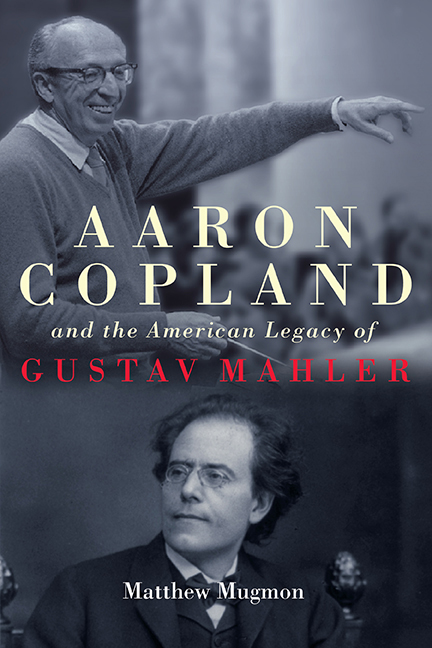Book contents
- Frontmatter
- Dedication
- Contents
- Acknowledgments
- Note on Musical Examples
- Introduction
- 1 Mahler and Copland in New York
- 2 Mahler in Nadia Boulanger's Studio and Beyond
- 3 Copland in Defense of Mahler
- 4 Mahler in Copland's Jewish Romanticism
- 5 Mahler's Idiom in Copland's “American” Sound
- 6 Copland, Koussevitzky, Mahler, and the Canon
- 7 Copland's Role in Bernstein's Mahler Advocacy
- Conclusion
- Notes
- Bibliography
- Index
- Eastman Studies in Music
2 - Mahler in Nadia Boulanger's Studio and Beyond
Published online by Cambridge University Press: 18 September 2019
- Frontmatter
- Dedication
- Contents
- Acknowledgments
- Note on Musical Examples
- Introduction
- 1 Mahler and Copland in New York
- 2 Mahler in Nadia Boulanger's Studio and Beyond
- 3 Copland in Defense of Mahler
- 4 Mahler in Copland's Jewish Romanticism
- 5 Mahler's Idiom in Copland's “American” Sound
- 6 Copland, Koussevitzky, Mahler, and the Canon
- 7 Copland's Role in Bernstein's Mahler Advocacy
- Conclusion
- Notes
- Bibliography
- Index
- Eastman Studies in Music
Summary
If Copland's deep relationship with Mahler's music had its roots in New York in the 1910s, it blossomed quickly and powerfully in the context of his European training, and in a setting that seems unlikely at first: the studio of Nadia Boulanger in Paris. When Copland arrived in Paris in June of 1921, Mahler's music—and indeed that of other Austro-German composers closely linked to the late nineteenth century— was likely far from his mind. Setting off for Paris was in part an assertion of his own status as a young American composer who consciously avoided Austro-German precedents. In this passage from a 1976 interview, Copland recalled his decision: “All the new music seemed to be coming from Paris in those days … so I decided to go to Paris to study. The older generation had all gone to Germany to study—in Leipzig, Munich, or Berlin where Strauss was. That was where they headed for. But my own generation began to see pieces by Debussy and Ravel and I guess some Roussel at that time, and so we wanted to go to Paris.” Little more than a week after reaching Paris, he began his study at the Conservatoire américain at Fontainebleau for the summer of 1921, which led him to the most important figure in his development as a composer: the noted organist and teacher Nadia Boulanger, who was on the faculty there. As he wrote to his parents, that introduction made clear that “she understands the kind of modern music I like to write,” making her “the teacher I was looking for.”
As it happened, Mahler's music was fresh in Boulanger's mind in 1921—a circumstance that, as we will see, translated directly into Copland's own relationship with Mahler. In May of 1920, just the year before Copland arrived in her studio, Boulanger's first documented introduction to Mahler's music took place at a pivotal moment in Mahler's musical afterlife. Over the course of two weeks, Willem Mengelberg, as leader of the Royal Concertgebouw Orchestra in Amsterdam, conducted the nine completed symphonies, Das Lied von der Erde, Kindertotenlieder, and Lieder eines fahrenden Gesellen.
- Type
- Chapter
- Information
- Aaron Copland and the American Legacy of Gustav Mahler , pp. 20 - 40Publisher: Boydell & BrewerPrint publication year: 2019



